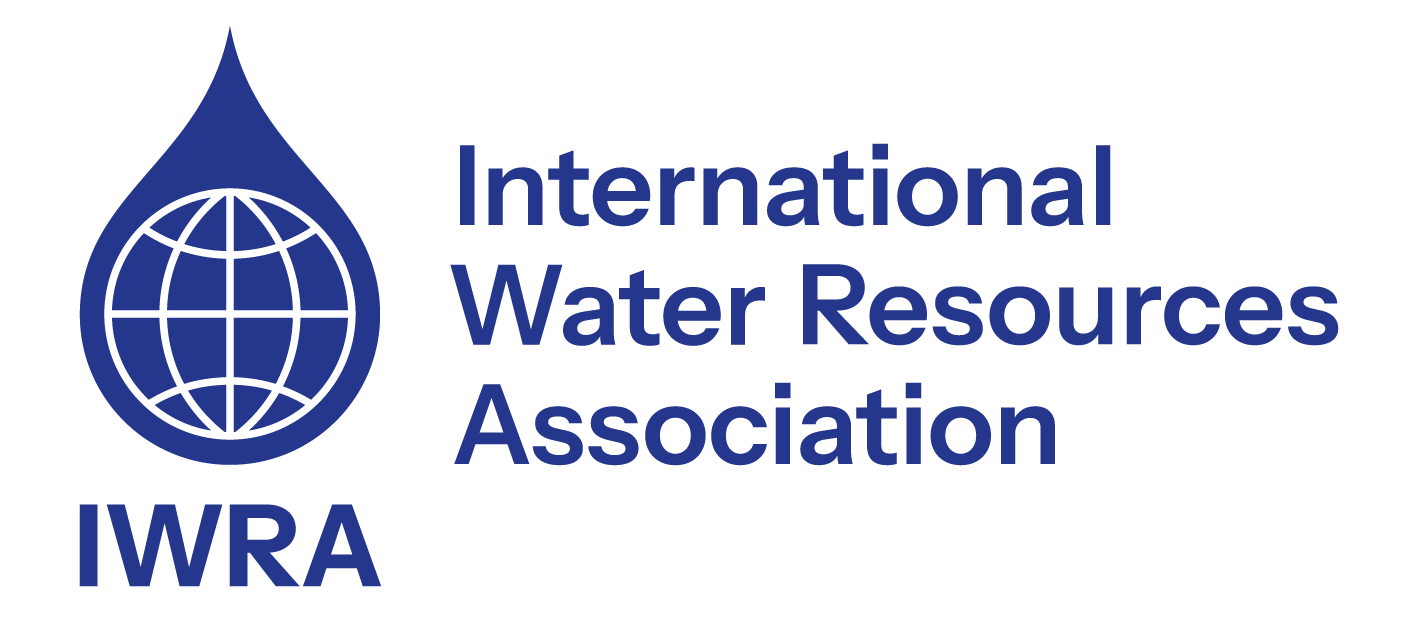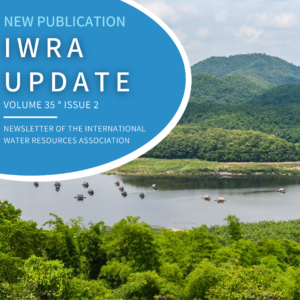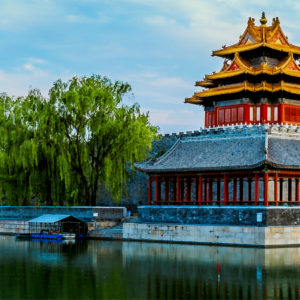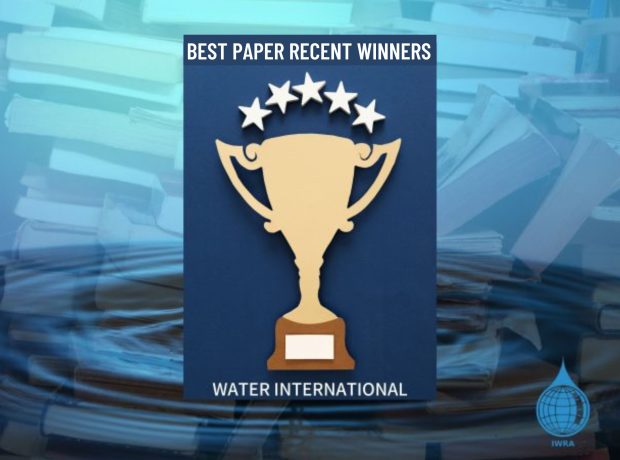
IWRA is pleased to announce the Best Paper and Honourable Mention for the Water International Best Paper 2022 and 2021 awards.
These awards hold immense significance, and IWRA takes the nomination of Best Paper and Honourable Mention seriously, employing an elaborate selection process. The selection process begins with the editors of Water International (WI) compiling a shortlist of candidate papers. This list is then forwarded to the WI Editorial Board, who meticulously evaluate and choose the successful candidates. As a result, the Water International Best Paper awards are announced a year or two after the publication of the articles, ensuring a thorough and fair assessment.
The authors of the awarded papers from 2021 and 2022 will be honored during the highly anticipated XVIII World Water Congress, scheduled to take place in Beijing, China, from September 11 to 15, 2023. This prestigious event will serve as a platform to acknowledge their remarkable contributions to the field of water resources and highlight their exceptional research.
BEST PAPER AWARDS 2022
Two papers were within a hair’s breadth of each other in the scoring, so for 2022 we are naming two Best Papers and no Honourable Mention. Both selections are on important institutional issues that have gained salience in the twenty-first century – how to reoperate reservoirs in a highly stressed basin to meet the challenges of climate change and competing demands, and how to finance the remunicipalisation of urban water. Both touch on critical policy issues of our time and are scalable, of much broader significance than to the localities studied.
Laura Turley, Christian Bréthaut & Géraldine Pflieger
Water International, 47.1, 30-54 doi10.1080/02508060.2021.19816362
This is an important and well-structured study on reservoir reoperation in the face of changing societal and environmental conditions with specific focus on the stressed Colorado River basin. It offers an important step in the right direction towards sustainable integrated water resource management. The topic of reoperating reservoirs to meet the challenges of climate change, with its envisioning of infrastructure, is of global relevance.
Laura Turley is Senior Manager at the Geneva Water Hub, a Competence Centre on Water and Peace at the University of Geneva, Switzerland; Christian Bréthaut is Associate Professor at the University of Geneva and Co-Director of the UNESCO Chair in Hydropolitics, and Géraldine Pflieger is the Director of the Institute for Environmental Sciences at the University of Geneva.
Access full article here.
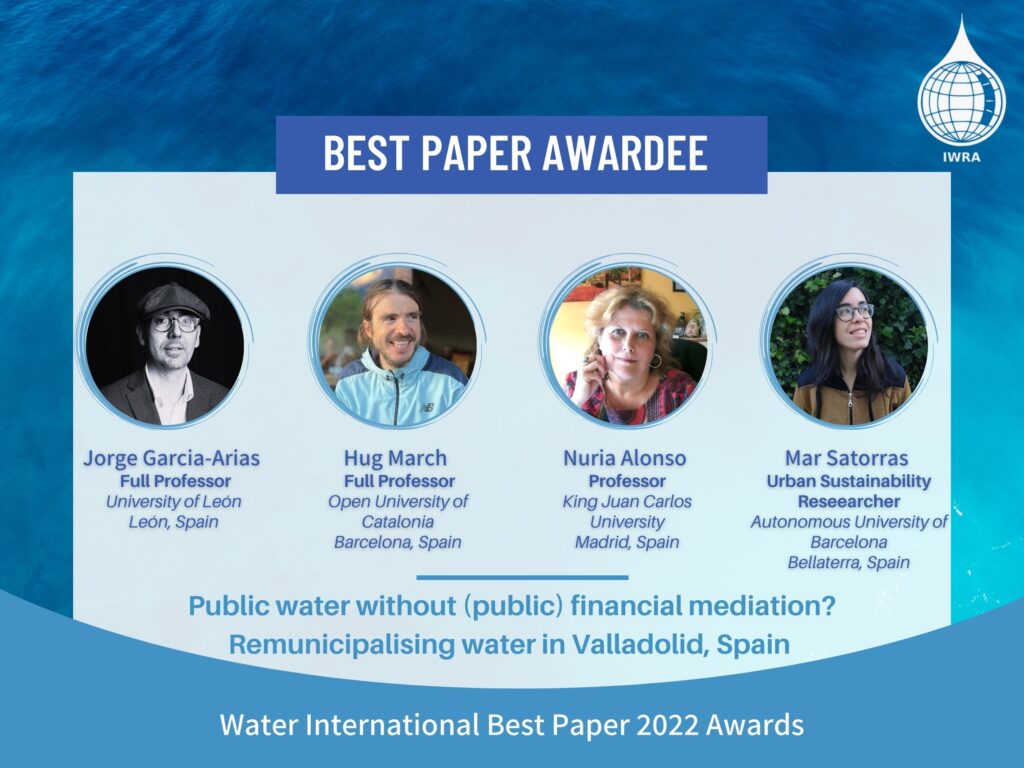
Public water without (public) financial mediation? Remunicipalising water in Valladolid, Spain
Jorge Garcia-Arias, Hug March, Nuria Alonso, and Mar Satorras
Water International, 47.5, 733-750 doi 10.1080/02508060.2022.2057071
This article, a contribution to the special issue on Public Banks and Public Water in Europe edited by David McDonald and Thomas Marois, analyses in detail an innovative remunicipalisation process in a public finance/public water framework, and a potential roadmap for remunicipalisation elsewhere, but with frank discussion of looming financial and political threats. The lessons that it draws are a contribution to the literature, with elements and insights that can be helpful for similar cases in other parts of the world where remunicipalisation of water services is an issue.
Jorge Garcia-Arias is Full Professor of International Political Economy & Critical Development Studies at the University of Leon (ULE), Spain. Hug March is Full Professor at the Faculty of Economics and Business, Universitat Oberta de Catalunya (UOC) and researcher at the Urban Transformation and Global Change Laboratory (TURBA, IN3, UOC), Barcelona, Spain. Nuria Alonso is a Professor in the Department of Applied Economics, Universidad Rey Juan Carlos (URJC), Móstoles, Spain, and Associated Researcher at the Complutense Institute for International Studies, Universidad Complutense de Madrid (UCM), Madrid, Spain. Mar Satorras is Urban Sustainability Researcher at the Institut Metròpoli, Autonomous University of Barcelona (UAB), Bellaterra, Spain, and affiliated researcher at the Urban Transformation and Global Change Laboratory (TURBA, IN3, UOC), Barcelona, Spain.
Access full article here.
BEST PAPER AWARDS 2021
As in the previous year, the Best Paper and Honourable Mention awards for 2021 are both international collaborations that exemplify what the International Water Resources Association and this its official journal aim to be — interdisciplinary, multinational, and linking social or physical science/technology and policy. The Best Paper, on Indigenous water rights, is written by four young scholars, three of them with Indigenous backgrounds. The Honourable Mention, led by an emerging scholar, develops a novel framework for wastewater reuse, and its successful application to Egypt, with implications elsewhere.
Nicole J. Wilson, Teresa Montoya, Rachel Arsenault & Andrew Curley
Water International, 46.6, 783-801 doi 10.1080/02508060.2021.1928972
This well-cited and very readable article draws on examples from the settler colonial states of Canada and the United States to illustrate how jurisdictional and regulatory injustices along with broader political and economic asymmetries generate water insecurity for Indigenous peoples and how those affected are pushing back by revitalizing Indigenous knowledge and governance systems. It blends historical and ethnographic analysis very well, and brings innovation to water research.
Nicole J. Wilson is Assistant Professor in the Department of Geography and Canada Research Chair in Arctic Environmental Change and Governance at the University of Manitoba, Canada; Teresa Montoya is Assistant Professor in the Department of Anthropology at the University of Chicago, USA; Rachel Arsenault is a Ph.D. student in the Faculty of Environmental Studies at York University, Canada; and Andrew Curley is Assistant Professor in the School of Geography, Development & Environment at the University of Arizona, USA.
Access full article here.

Unpacking wastewater reuse arrangements through a new framework: insights from the analysis of Egypt
Mohamed Hassan Tawfik, Jaime Hoogesteger, Amgad Elmahdi and Petra Hellegers
Water International, 46.4, 605-625 doi 10.1080/02508060.2021.1921503
This article provides an informative overview of wastewater reuse in Egypt and develops a novel, multidimensional socio-technical framework to analyze the current situation in different social, technological and environmental contexts. It points out bottlenecks of current wastewater reuse policies and programmes.
Mohamed Hassan Tawfik is a recent Ph.D. in water resources management from Wagenngen University, the Netherlands Jaime Hoogesteger is Assistant Professor in the Water Resources Management Group, Wageningen University. Amgad Elmahdi is Water Sector Lead at Green Climate Fund, Republic of Korea, and Petra Hellegers is Full Professor and Chair of the Water Management Group, Wageningen University.
Access full article here.
Congratulations to all the winners!
